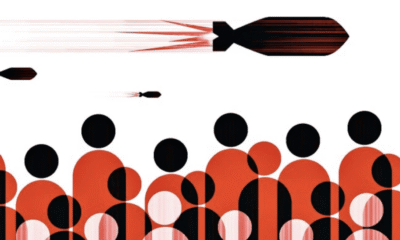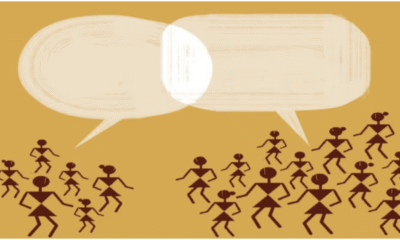
|
Getting your Trinity Audio player ready...
|
(The article was originally published in Indian Express on December 23, 2023 as a part of Dr Madhav’s column titled ‘Ram Rajya’. Views expressed are personal.)
It is said that “leaders are born, they are not made”. But those destined to become leaders need a nurturing institutional environment. India is fortunate that its Independence era leadership chose for its diverse people the political system of parliamentary democracy. In the last seven decades, it not only functioned successfully but also produced a great lineup of luminary leaders.
India’s first prime minister, Jawaharlal Nehru was a product of the Independence movement itself, not necessarily the parliamentary route. It is well known that the majority of the provincial Congress committees recommended Sardar Patel for the post. But Nehru evolved as a parliamentarian and mass leader over a decade-and-a-half-long parliamentary career.
Congress set in motion the evil of dynastic politics after Nehru’s demise, which continues to be the bane of the party to this day. There is a stark difference between leaders who are the products of parliamentary democracy and those of dynastic politics. The dynasts can never fully appreciate and demonstrate the leadership values and principles of parliamentary democracy.
One shining star of the Indian parliamentary democracy was Atal Bihari Vajpayee. It has been 99 years since the stalwart politician and former prime minister was born, and five years since he departed. Vajpayee did not inherit politics. He entered it as a young activist, struggled his way through the rough and tumble and evolved through the parliamentary process into a mature statesman.
Vajpayee was an outstanding example of political leadership in a democratic polity. When he first entered the Parliament in 1957, he was just a 33-year-old ideologically motivated young man trained in the RSS brand of Hindu idealism. That idealism, coupled with unmatched oratorical skills, made him popular both inside and outside Parliament in no time.
In the Congress-dominated political era in the first three decades after Independence, Vajpayee emerged as the ideological alternative and can be given much of the credit for the BJP’s spectacular rise from the fringes to the mainstream. He was a bitter critic of Nehru’s policies, occasionally going to the extent of throwing veiled personal criticisms. “You have a split personality,” he once told Nehru and threw the jibe that the then PM had an “inverted vision” because he did too much of Shirshasana – the yogic posture of standing on one’s head. But there was always decorum, unlike the cheap antics of the Opposition today. As Vajpayee rose in stature, Nehru, too, admired him and introduced him to a foreign dignitary as someone who would be the prime minister one day.
Vajpayee was well known for his great oratory. But he was not a demagogue. As a poet par excellence, he measured his words carefully. American journalist Edward Murrow once said of British Prime Minister Winston Churchill that he “mobilised the English language and sent it into battle”. Vajpayee, like his successor Modi, used his facility with language to disarm his opponents many a times. It earned him the sobriquet of “wordsmith”.
He remained the most enigmatic politician of our times. Admirers called him a moderate — “the right man in a wrong party”. Critics saw in him a “Teflon-coated” Hindutva-vadi. Vajpayee, irrespective of the accolades, remained a leader who always held the nation above everything else, including his party. Behind his mild-mannered façade hid a strong nationalist, who couldn’t be browbeaten by circumstances. He became prime minister three times and remained in office for over six years.
The country saw both the avatars of Vajpayee during those six years. Leading a 23-party coalition was not easy. He was pulled down by a recalcitrant regional ally in 1999. But he never held it against anybody. He insisted that regional parties had come to stay. When asked whether the era of coalitions would end, his answer, after the characteristic pause, was that even then the politics of consensus must continue. National parties must develop an understanding of regional aspirations, he used to exhort.
The nuclear tests in 1998 showed the tougher side of Vajpayee. He boldly declared in Parliament that “India is now a nuclear weapon state. This is a reality that cannot be denied”. He later told the media that he knew sanctions would come, but that did not deter him. Then came the Kargil War. The six-week-long war saw the Vajpayee government backing the armed forces fully in successfully defeating and driving out the enemy. Just a year before, he was in Lahore riding a bus.
Atal ji’s greatness is not limited to his prime ministership. He represented an ideal as an Opposition leader, something that the present-day Opposition fails to demonstrate. He was with the government when the Bangladesh War happened in 1971. He was with the Narasimha Rao government when India needed a united and strong voice at the UN to defeat Pakistan’s machinations.
Arun Jaitley, delivering the memorial address for Vajpayee, recalled that his best orations were not when he was on the treasury benches, but when he occupied the other side. Among the best was his obituary address for Jawaharlal Nehru in Parliament in 1964.
“Ek sapna tha jo adhoora rah gaya, ek geet tha jo goonga ho gaya/ Ek lau thi jo anant mein vileen ho gayi/ Bharat mata aaj shok magn hai, uska sabse laadla rajkumar kho gaya/ Vishwa ke rangmanch se ek pramukh abhineta apana antim abhinaya dikha kar, antar dhyan ho gaya.” (A dream is incomplete; A song is silent/ There was a flame that diffused into eternity/ Bharat Mata is grieving today; she lost her most beloved prince/ A famous actor departed from the world stage after performing his final act.)
What a quality tribute to a political adversary! Jaitley’s quip — “I hope those who claim the political legacy of Pandit Ji, if they have an aptitude for reading will certainly read these two paragraphs” — sums up what the Opposition lacks today.





Matthew Arnold, the High Priest of English Literature speaks about “rounded perfection” of immortal poets like Shakespeare. It means milti-dimensional perfection. In human personality we find rounded perfection, though very rarely. One solitary example is Atalji(ABVP- Atal Behari VajPayee). Atalji was a leader “ for all times” as correctly and conclusively demonstrated by Manya Ram Madhavji. Atalji was a leader who could be glorified as a Hero. All leaders are not heroes. Those leaders whom worship as ideal personalities worth emulating are true Heroes; the immortal ones. Atalji is one such leader who lives amidst us in our memory and imagination . Atalji is truly a hero; a Hero of Thomas Carlyle’s prescription.(Ref, On Heroes and Heroworship by Carlyle ,a Victorian English writer. Ram Madhavji has shed light on the multi-sided,multi-level and multi-structured personality of Atalji . How long we wait for a hero of Atalji’s texture and style? An infinity question.
Thanks to dear Ram Madhavji for the text and context to read, think and understand the person that is Atalji- “ What a piece of work is man? Infinite in faculties, angelic in movement, paragon of animals…”( Shakespeare, ‘ Hamlet’)
☘️
Excellent analysis and hope that our present day opposition heeds to the authors advice.